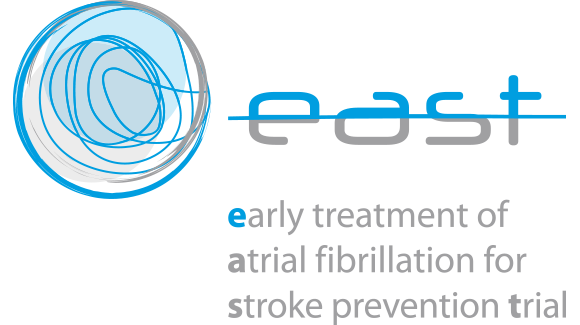
EAST - AFNET 4:
Early treatment of atrial fibrillation for stroke prevention trial
This trial is partially supported by the German Center for Cardiovascular Research (Deutschen Zentrum für Herz-Kreislauf-Forschung e.V., DZHK) .
PATIENTS
End of patient enrollment 31.12.2016
End of follow-up 06.03.2020
2.789 Patienten randomised
135 recruting sites
Status June 2020
2745
Planned number of patients
PARTICIPATING COUNTRIES
11 European countries:
Belgium, Czech Republic, Denmark, France, Germany, Great Britain, Italy, Netherlands, Poland, Spain, Switzerland
PUBLICATIONS
Jensen M, Suling A, Metzner A, Schnabel R, Borof K, Goette A, Haeusler KG, Zapf A, Wegscheider K, Fabritz L, Diener H-C, Thomalla G, Kirchhof P. Early rhythm-control therapy for atrial fibrillation in patients with a history of stroke: a subgroup analysis of the EAST- AFNET 4 trial. Lancet Neurol 2023; 22: 45–54. DOI: 10.1016/PIIS1474-4422(22)00436-7
Eckardt L, Sehner S, Suling A, Borof K, Breithardt G, Crijns HJGM, Goette A, Wegscheider K, Zapf A, Metzner A, Kirchhof P. Attaining sinus rhythm mediates improved outcome with early rhythm control therapy of atrial fibrillation: the EAST – AFNET 4 trial. European Heart Journal, 29 August 2022. doi: 10.1093/eurheartj/ehac471
Rillig A, Borof K, Breithardt G, Camm AJ, Crijns HJGM, Goette A, Kuck KH, Metzner A, Vardas P, Vettorazzi E, Wegscheider K, Zapf A, Kirchhof P. Early Rhythm Control in Patients With Atrial Fibrillation and High Comorbidity Burden. Circulation 2022. Epub 15 August 2022. . doi: 10.1161/CIRCULATIONAHA.122.060274
Goette A, Borof K, Breithardt G, Camm AJ, Crijns HJG, Kuck KH, Wegscheider K, Kirchhof P. Presenting Pattern of Atrial Fibrillation and Outcomes of Early Rhythm Control Therapy. J Am Coll Cardiol. 2022;80(4):283-295
Metzner A, Suling A, Brandes A, Breithardt G, Camm AJ, Crijns HJGM, Eckardt L, Elvan A, Goette A, Haegeli L, Heidbuchel H, Kautzner J, Kuck KH, Mont L, NG A, Szumowski L, Themistoclakis S, van Gelder I, Vardas P, Wegscheider K, Willems S, Kirchhof P. Anticoagulation, therapy of concomitant conditions, and early rhythm control therapy: a detailed analysis of treatment patterns in the EAST - AFNET 4 trial. Europace (2021) 00, 1–13, 02 September 2021. doi:10.1093/europace/euab200
Willems S, Borof K, Brandes A, Breithardt G, Camm AJ, Crijns HJGM, Eckardt L, Gessler N, Goette A, Haegeli L, Heidbuchel H, Kautzner J, NG A, Schnabel R, Suling A, Szumowski L, Themistoclakis S, Vardas P, van Gelder I, Wegscheider K, Kirchhof P. Systematic, early rhythm control strategy for atrial fibrillation in patients with or without symptoms: the EAST-AFNET 4 trial. European Heart Journal, 27 August 2021. doi:10.1093/eurheartj/ehab593
Rillig A, Magnussen C, Ozga AK, Suling A, Brandes A, Breithardt G, Camm AJ, Crijns HJGM, Eckardt L, Elvan A, Goette A, Gulizia M, Haegeli L, Heidbuchel H, Kuck KH, NG A, Szumowski L, van Gelder I, Wegscheider K, Kirchhof P. Early rhythm control therapy in patients with atrial fibrillation and heart failure. Circulation 2021. Epub 30 July 2021. [published online ahead of print]. doi: 10.1161/CIRCULATIONAHA.121.056323
McNamara DA, Chopra R, Ganantra RB, Suzuki T, Kirchhof P, Wegscheider K, Breithardt G. Letter to the editor: EAST-AFNET 4 Early rhythm control therapy in patients with atrial fibrillation. New England Journal of Medicine. Epub 04 February 2021. doi: 10:1056/NEJMc2032433
Kirchhof P, Camm AJ, Goette A, Brandes A, Eckardt L, Elvan A, Fetsch T, van Gelder IC, Haase D, Haegeli LM, Hamann F, Heidbüchel H, Hindricks G, Kautzner J, Kuck K-H, Mont L, Ng GA, Rekosz J, Schön N, Schotten U, Suling A, Taggeselle J, Themistoclakis S, Vettorazzi E, Vardas P, Wegscheider K, Willems S, Crijns HJGM, Breithardt G, for the EAST–AFNET 4 trial investigators. Early rhythm control therapy in patients with atrial fibrillation. New England Journal of Medicine. Epub 29 Aug 2020. doi: 10.1056/NEJMoa2019422
Haegeli L, Aliot E, Brandes A, Eckardt L, Elvan A, Gulizia M, Heidbuchel H, Kautzner J, Mont L, Morgan J, Ng A, Szumowski L, Themistoclakis S, Van Gelder IC, Willems S, Kirchhof P. The EAST study: redefining the role of rhythmcontrol therapy in atrial fibrillation: EAST, the Early treatment of Atrial fibrillation for Stroke prevention Trial. Eur Heart J. 2015 Feb 1;36(5):255-6. doi: 10.1093/eurheartj/ehu476. Epub 2015 Jan 30.
Kirchhof P, Breithardt G, Camm AJ, Crijns H, Kuck K-H, Vardas P, Wegscheider K. Improving outcomes in patients with atrial fibrillation: Rationale and design of the Early treatment of Atrial fibrillation for Stroke prevention Trial. Am Heart J 2013; 166(3):442-8. doi:10.1016/j.ahj.2013.05.015
Van Gelder IC, Haegeli LM, Brandes A, Heidbuchel H, Aliot E, Kautzner J, Szumowski L, Mont L, Morgan J, Willems S, Themistoclakis S, Gulizia M, Elvan A, Smit MD, Kirchhof P. Rationale and current perspective for early rhythm control therapy in atrial fibrillation. Europace 2011;13:1517-25. DOI:10.1093/europace/eur192.
Sponsor
Atrial Fibrillation NETwork (AFNET), Münster, Germany
Coordinating Investigators
Prof. Paulus Kirchhof, Hamburg, Germany
Prof. Günter Breithardt, Münster, Germany
Prof. Harry Crijns, Maastricht, The Netherlands
Prof. John Camm, London, UK
Registration
ClinicalTrials.gov: NCT01288352
ISRCTN: ISRCTN04708680
EudraCT: 2010-021258-20
Website: www.easttrial.org
